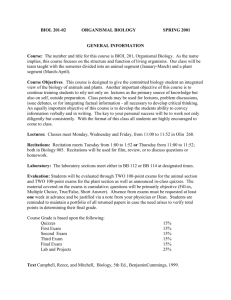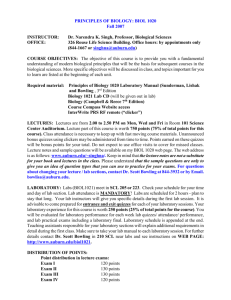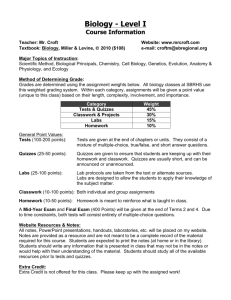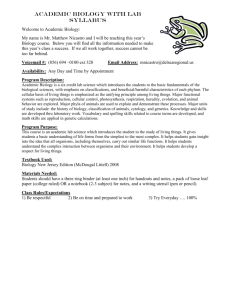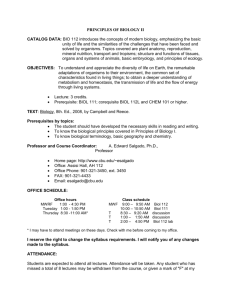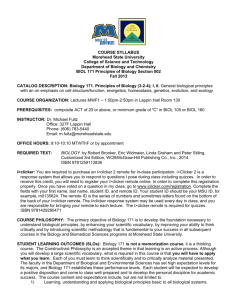BIOL 171 002 Spring 2013 - Morehead State University
advertisement
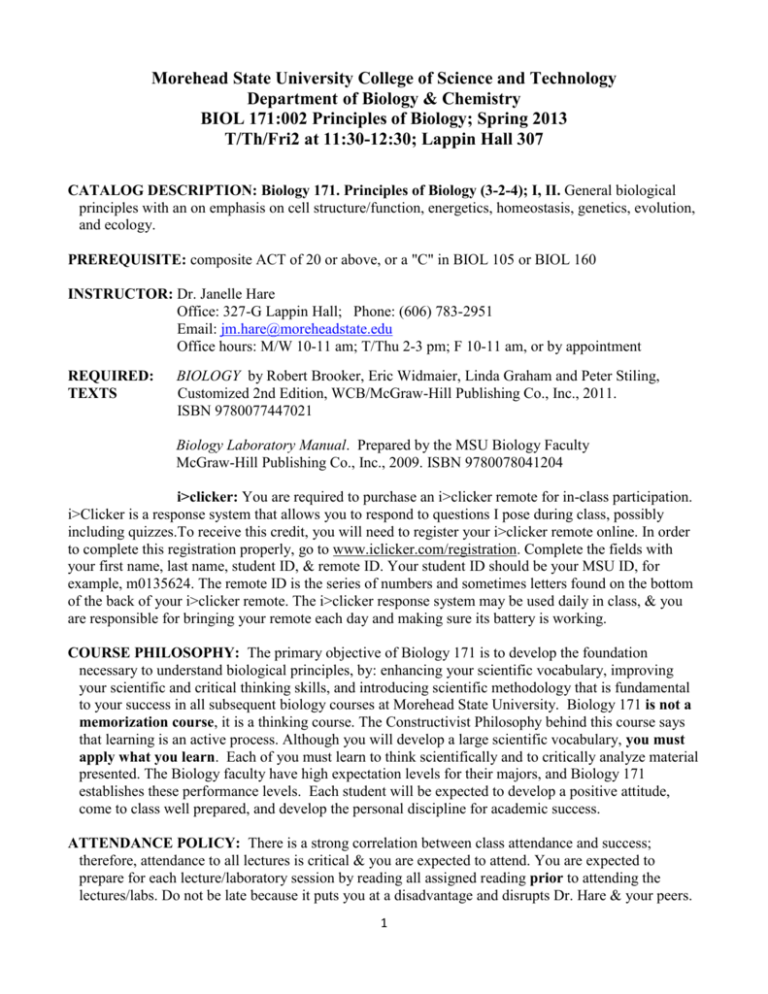
Morehead State University College of Science and Technology Department of Biology & Chemistry BIOL 171:002 Principles of Biology; Spring 2013 T/Th/Fri2 at 11:30-12:30; Lappin Hall 307 CATALOG DESCRIPTION: Biology 171. Principles of Biology (3-2-4); I, II. General biological principles with an on emphasis on cell structure/function, energetics, homeostasis, genetics, evolution, and ecology. PREREQUISITE: composite ACT of 20 or above, or a "C" in BIOL 105 or BIOL 160 INSTRUCTOR: Dr. Janelle Hare Office: 327-G Lappin Hall; Phone: (606) 783-2951 Email: jm.hare@moreheadstate.edu Office hours: M/W 10-11 am; T/Thu 2-3 pm; F 10-11 am, or by appointment REQUIRED: TEXTS BIOLOGY by Robert Brooker, Eric Widmaier, Linda Graham and Peter Stiling, Customized 2nd Edition, WCB/McGraw-Hill Publishing Co., Inc., 2011. ISBN 9780077447021 Biology Laboratory Manual. Prepared by the MSU Biology Faculty McGraw-Hill Publishing Co., Inc., 2009. ISBN 9780078041204 i>clicker: You are required to purchase an i>clicker remote for in-class participation. i>Clicker is a response system that allows you to respond to questions I pose during class, possibly including quizzes.To receive this credit, you will need to register your i>clicker remote online. In order to complete this registration properly, go to www.iclicker.com/registration. Complete the fields with your first name, last name, student ID, & remote ID. Your student ID should be your MSU ID, for example, m0135624. The remote ID is the series of numbers and sometimes letters found on the bottom of the back of your i>clicker remote. The i>clicker response system may be used daily in class, & you are responsible for bringing your remote each day and making sure its battery is working. COURSE PHILOSOPHY: The primary objective of Biology 171 is to develop the foundation necessary to understand biological principles, by: enhancing your scientific vocabulary, improving your scientific and critical thinking skills, and introducing scientific methodology that is fundamental to your success in all subsequent biology courses at Morehead State University. Biology 171 is not a memorization course, it is a thinking course. The Constructivist Philosophy behind this course says that learning is an active process. Although you will develop a large scientific vocabulary, you must apply what you learn. Each of you must learn to think scientifically and to critically analyze material presented. The Biology faculty have high expectation levels for their majors, and Biology 171 establishes these performance levels. Each student will be expected to develop a positive attitude, come to class well prepared, and develop the personal discipline for academic success. ATTENDANCE POLICY: There is a strong correlation between class attendance and success; therefore, attendance to all lectures is critical & you are expected to attend. You are expected to prepare for each lecture/laboratory session by reading all assigned reading prior to attending the lectures/labs. Do not be late because it puts you at a disadvantage and disrupts Dr. Hare & your peers. 1 If you have a valid, documented excuse (such as for illness/injury, death in the family, or universitysponsored activity; or for an extended absence see Dean of Students Kevin Koett, 211 ADUC, (7832014)) should promptly notify Dr. Hare and their Lab Instructor in order to make up the material missed and/or reschedule the lab exercise. Lab attendance is mandatory!! Labs missed may be made-up only during the week of the absence. Students failing to make up a lab will be penalized 15 pts. TENTATIVE SCHEDULE OF LECTURE TOPICS Date Topic 1/15 The field of Biology and its two major principles 1/17 Size, Microscopy, Scientific Method 1/22 Atoms, Molecules and Water 1/24 Atoms, Molecules and Water 1/25 Organic Molecules 1/29 Organic Molecules 1/31 Cells and cellular organelles 2/5 Cells and cellular organelles 2/7 Membrane Structure, Function & Synthesis 2/8 Membrane Structure, Function & Synthesis 2/12 Exam 1 (Ch 1-5) 2/14 Energy and Enzymes 2/19 Energy and Metabolism 2/21 Photosynthesis: Part I, harvesting light energy 2/22 Photosynthesis: Part II, making carbohydrates 2/26 Photosynthesis, continued 2/28 Cellular Respiration, using Oxygen 3/5 Cellular Respiration without Oxygen 3/7 Cellular Respiration, continued 3/8 Eukaryotic cell cycle: mitosis and DNA damage 3/12 Exam 2 (over Ch 6, 7, 8 only) 3/14 Meiosis SPRING BREAK 3/26 Simple Inheritance 3/28 Complex patterns of inheritance 4/2 Complex patterns of inheritance 4/4 Nucleic acid structure, DNA replication 4/5 Central Dogma, Transcription & Translation 4/9 Transcription & Translation 4/11 Gene regulation 4/16 Exam 3 (Ch 11-17) 4/18 Theory of Evolution 4/19 Processes of evolution 4/23 Population genetics: selections, drift 4/25 Classifying living things: taxonomy & systematics 4/30 Population Ecology 5/2 Species interacting 5/3 Communities Chapter/pgs 1, 26.1 1, 4.1 2 2 3 3 4 4 5 5 5/6 FINAL EXAM Monday, May 6 12:45 – 2:45 pm in 307 LA 25 points of comprehensive material; 100 points of material on Chapters 23-26 and 56-58 2 6 6 8 8 8 7 7 7 15 15, (14) 16 17 17 11 11, 12 12 13 23 23 24 25.1-3, 26 56 57 58 COURSE GRADES: Students performance in the course will be evaluated by four lecture exams. The first three are each worth 100 points (SLOs 1,2,3,4,5), with the Final exam having 100 points over the last quarter or classes and a 25 point comprehensive portion, lecture quizzes (100 points total), three laboratory exams (50 points each), lab quizzes (25 points total) and a laboratory writing exercise (25 points). GRADING: Grades will be assigned on a % basis of 750 points. Lecture Exam 1 100 pts Grading Scale: A = 90-100% Exam 2 100 pts B = 80-89% Exam 3 100 pts C = 70-79% Exam 4 125 pts D = 60-69% Quizzes/Assignments 125 pts E ≤ 59% 550 Points Laboratory Lab Exam 1 50 pts Lab Exam 2 50 pts Lab Exam 3 50 pts Lab Quizzes 25 pts Lab Writing Exercise 25 pts 200 Points EXAMINATIONS: A student with a valid excuse (verification required) for missing an exam should notify Dr. Hare beforehand if possible in order to schedule a make-up examination within one week following return to class. An exam missed without an acceptable excuse will be recorded as a Zero. All exams will be available for review for one week after the exam grades are returned. Students may review exams in Dr. Hare’s office 327F Lappin Hall or during the scheduled tutor session. The Final Exam (Exam IV) will be approximately 25% comprehensive. QUIZZES/ASSIGNMENTS: A number of quizzes (approximately 12) worth varying point values will be given. You will not be penalized for missing a quiz if you have a University approved excuse. If you should leave class before the end of class after taking the quiz, then you will receive a zero on that quiz. Quizzes may be visual, matching, multiple choice, fill in the blank, and/or short answer. Quizzes may be given using the i>clicker system. Assignments may be take home, written assignments or to be completed online. LABORATORY EXAM REVIEW SESSIONS: Will take place on the Friday before each Lab Exam starting at 12:40 in Lappin 332 (171 Lab). HOW TO HAVE SUCCESS IN THIS CLASS : 1) Use the online learning center for our text : http://highered.mcgraw-hill.com/sites/0073532215/student_view0/index.html It has animations, pre-tests and post-tests over each chapter and animations. Check out ‘Biology Prep’ 2) Attend the TUTOR SESSION: Weekly tutor sessions for BIOL 171 will be held. Tutoring may also be received by making an appointment or through the Learning Lab in 208 Allie Young Hall (783-5200). 3) RETENTION POLICY: To help you achieve success, I have set the following policy: During the first four weeks, if you are not attending class regularly and/or are performing below the 70% level, I may contact you to schedule an appointment with me in order to discuss how you might improve your performance in BIOL 171. If you receive a score of less than 70% on the first major exam, you are expected to schedule an appointment with me in order to discuss how you might improve your performance in BIOL 171 4) Use the “study buddy” or “study group” system in which you pair-up with another member(s) of the class and spend time each week going over the material presented in lecture and lab. 3 STUDENT LEARNING OUTCOMES (SLOs): The course content and expectations include: 1) Learning, understanding & applying biological principles basic to all biological systems. These include: *The organization of biomolecules and life processes; *The flow of energy through the levels of biological organization; *The homeostatic principles required for regulation of molecular, cellular, organismic and ecosystems; *Basic genetic systems that govern cell activities; *Basic evolutionary and ecological concepts as applied to populations and ecosystems. 2) The development of a vocabulary sufficient for the comprehension of the complex world of biological disciplines. 3) The development of a solid foundation upon which subsequent biology courses can be built. 4) An understanding of the thinking processes through which scientists operate. 5) The application of quantitative principles utilized in mathematics and the interpretation of graphed data in order to understand the basic principles of biology. General Education STUDENT LEARNING OUTCOMES: BIOL 171 is designated as an Exchange Course for students enrolled in the Biology and Biomedical Science Degree Programs, and upon successful completion of this course, students will have satisfied NSC1 of their General Education requirements. GENERAL EDUCATION Student Learner Outcomes (GE): 1b. Read college-level critical, creative, and technical texts for comprehension. 1d. Convey quantitative and qualitative relationships using symbols, equations, graphs, and tables. 2b. Recognize and effectively utilize both deductive and inductive reasoning. 4d. Comprehend the cycle of human growth necessary to provide sustained health & individual well-being. 5a. Comprehend and apply basic scientific, quantitative, and technological methods and knowledge of natural systems to the solution of scientific problems. 5b. Employ scientific methods and theories to analyze and address open and debated questions in the sciences 5c. Analyze explanations to classify them as scientific or nonscientific. CLASSROOM BEHAVIOR: Plagiarism or cheating in any form, including allowing other to cheat off of you, will not be tolerated and will be dealt with in accordance with Appendix A of the student handbook and the University Undergraduate Catalog. Academic dishonesty, as defined by the University occurs when you do not do your own work, fail to give credit for the work of others, or use resources inappropriately. Consistent tardiness is not acceptable. You are expected to be in your seat and ready for class prior to every class period unless Lappin 307 is locked. Cell Phones (including Blackberry’s and I phones), walkie talkie’s, PDA’s, and beepers must be shut off upon entering the classroom. MP3 Players, iPods or any other device requiring the use of headphones are not permitted during class. Laptops and tape recorders are welcome but must be kept at your desk. You may not have power cords running across the floor for safety reasons (It is your responsibility to have a fully charged battery). If I discover that you are doing anything other than course related material on your laptop during class I will collect your computer and you can pick it up immediately following class. Following your second offense you will lose your privilege to bring your laptop back to class. DISABILITY STATEMENT: In compliance with the Americans with Disabilities Act (ADA), all students with a documented disability are entitled to reasonable accommodations and services to support their academic success and safety. Though a request for services may be made at any time, services are best applied when they are requested at or before the start of the semester. To receive accommodations and services the student should immediately contact the Disability Services Coordinator, Evangeline Day in 204-E ADUC, at 606-783-5188, or e.day@moreheadstate.edu. 4 CAMPUS SAFETY STATEMENT: Emergency response information will be discussed in class. Students should familiarize themselves with the nearest exit routes in the event evacuation becomes necessary. You should notify your instructor at the beginning of the semester if you have special needs or will require assistance during an emergency evacuation. Students should familiarize themselves with emergency response protocols at http://www.moreheadstate.edu/emergency. USE OF TECHNOLOGY: Students may be expected to use the internet for literature searches of laboratory projects as well as the use of e-mail, word processing, and any other appropriate software needed to complete assignments. In several of the laboratory sessions, students will use technical procedures involving micropipetters, spectrophotometers, and gel electrophoresis set-ups in order to reach the designated outcome. ADD/DROP DATE: The last date to drop this class with a grade of W is March 29th. A special section of BIOL 105 is available for students to enter if during the first half of the semester they feel they are not adequately prepared for Principles of Biology (BIOL 171). Biology 105 begins on Monday, March 11th (8:00-9:00, MTWThF, taught by Dr. Matt Ellison) and will use the same text, without the laboratory component. IMPORTANT DATES: January 21 March 11 March 18-22 March 29 April May 6, 12:45 pm Martin Luther King Jr. Day (no class) Mid-term grades due Spring Break Last day to drop with grade of “W” Advance registration for Fall Final Exam 5 NCATE appendix BIOL 171:002 Principles of Biology; Spring 2013 Department of Biology & Chemistry T/Th/Fri2 at 11:30-12:30; Lappin Hall 307 College of Science and Technology, Morehead State University “Community Engagement: A Light to and from the Mountains” The Professional Education Unit at Morehead State University delivers rigorous, high quality programs that prepare professionals informed by best national and international scholarship, plus research, literature, and experiences specific to Appalachia- preparing professionals to improve the schools, quality of life, and the communities in which they live and serve. This statement is not only the strategic mission for the College, but it also incorporates the conceptual framework that guides all our activities. Conceptual Framework Outcomes (CFOs): The Unit and the faculty within individual programs assess the degree to which its graduates: 1) Master the content knowledge, professional and the twenty – first century skills need to make an optimal contribution to “whole” student learning in education settings. 2) Are competent in the collection and use of data to inform decision – making and to demonstrate accountability for student learning. 3) Demonstrate professional dispositions 4) Are culturally competent and understand the regions from which they have come utilizing knowledge and experiences to effectively “bridge the gaps” (economic, achievement, and geographic) ensuring optimal learning for all students. 5) Engage in authentic field experiences in collaboration with committed school – based partners and are empowered to improve the quality of education throughout this region and beyond. NCATE/ EPSB Accreditation Alignment of CFOs and SLOs: Program: Biology-Teaching BIOL 171 Principles of Biology Aligned with National Science Teacher Association – Teacher Content Knowledge A.2.a.1-13 A.2.b.16-18 Description of assignment Assessment (point values) Lecture exams Exams will assess content knowledge and conceptual understanding of (425) the course material from lecture. Exams will be taken during scheduled CFO:1, 2 class time. SLO: 1,2,3,4,5 Lecture quizzes A.2.a.1-13 Lecture quizzes will assess content knowledge and conceptual (125) A.2.b.16-18 understanding of the course material from lecture. Quizzes will be taken CFO: 1, 2 during scheduled class time. SLO: 1,2,3,4,5 Laboratory Exams A.2.a.1-13 Exams will assess content knowledge as well as conceptual (150) A.2.b.16-19 understanding of the laboratory material. Students will also be assessed CFO: 1, 2 on their ability to perform laboratory skills. Exams will be taken during SLO: 1,2,3,4,5 scheduled laboratory times Laboratory A.2.a.1-13 Laboratory quizzes will assess content knowledge and conceptual Quizzes (25) A.2.b.16-19 understanding of the course material from lab. Quizzes will be taken CFO: 1,2 during scheduled laboratory time. SLO: 1,2,3,4,5 Laboratory A.2.a.1-13 This writing assignment will assess the ability of the student to take data Writing Exercise A.2.b.16-19 gathered from lab and prepare a properly structured laboratory report (25) including tables and graphs. The data will be gathered in the laboratory CFO: 1,2 and the assignment will be completed as homework. SLO: 1,2,3,4,5 Special Note: The EPSB Standards 1-4, while they are utilized in these courses by the instructors as they follow best practices, are not overtly instructed nor included in the assessment pieces listed above. Required Field Experience Hours: 0 6
